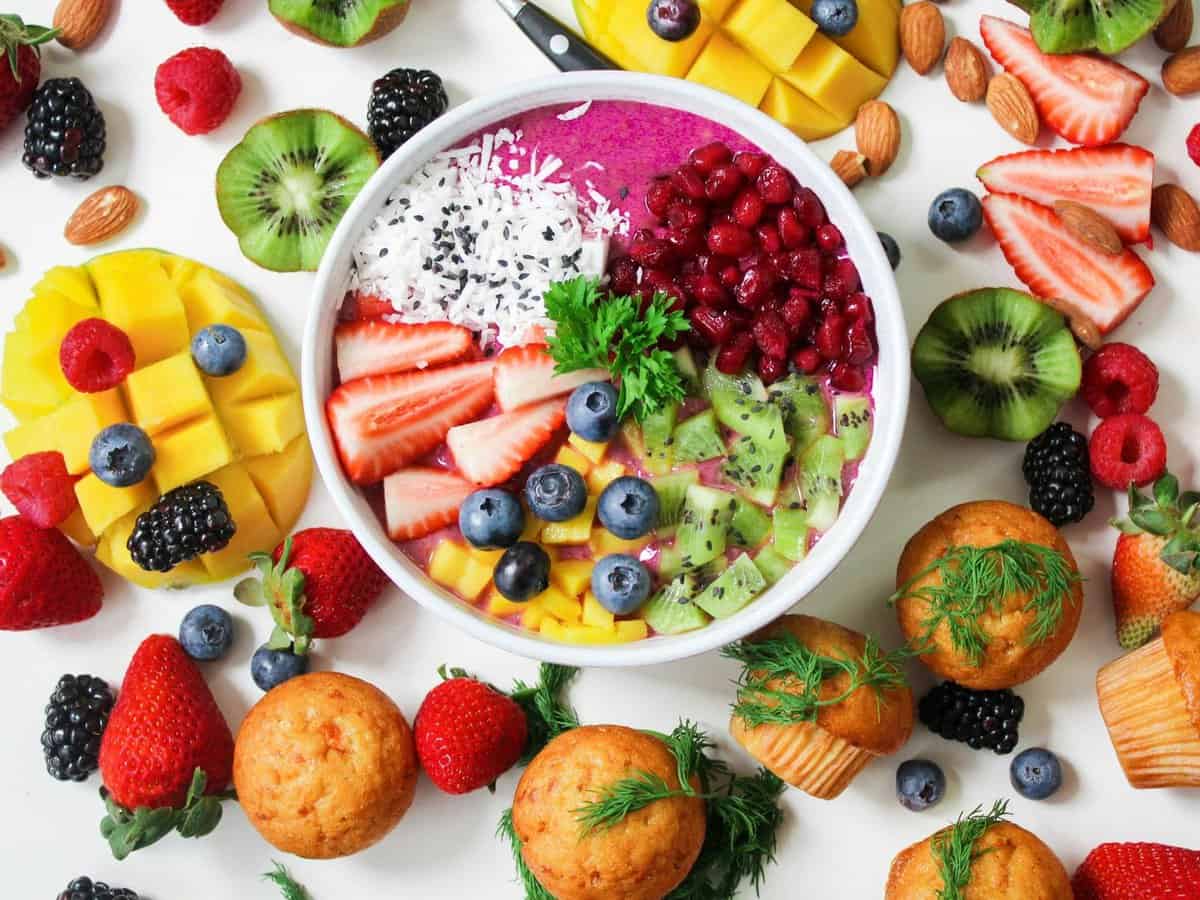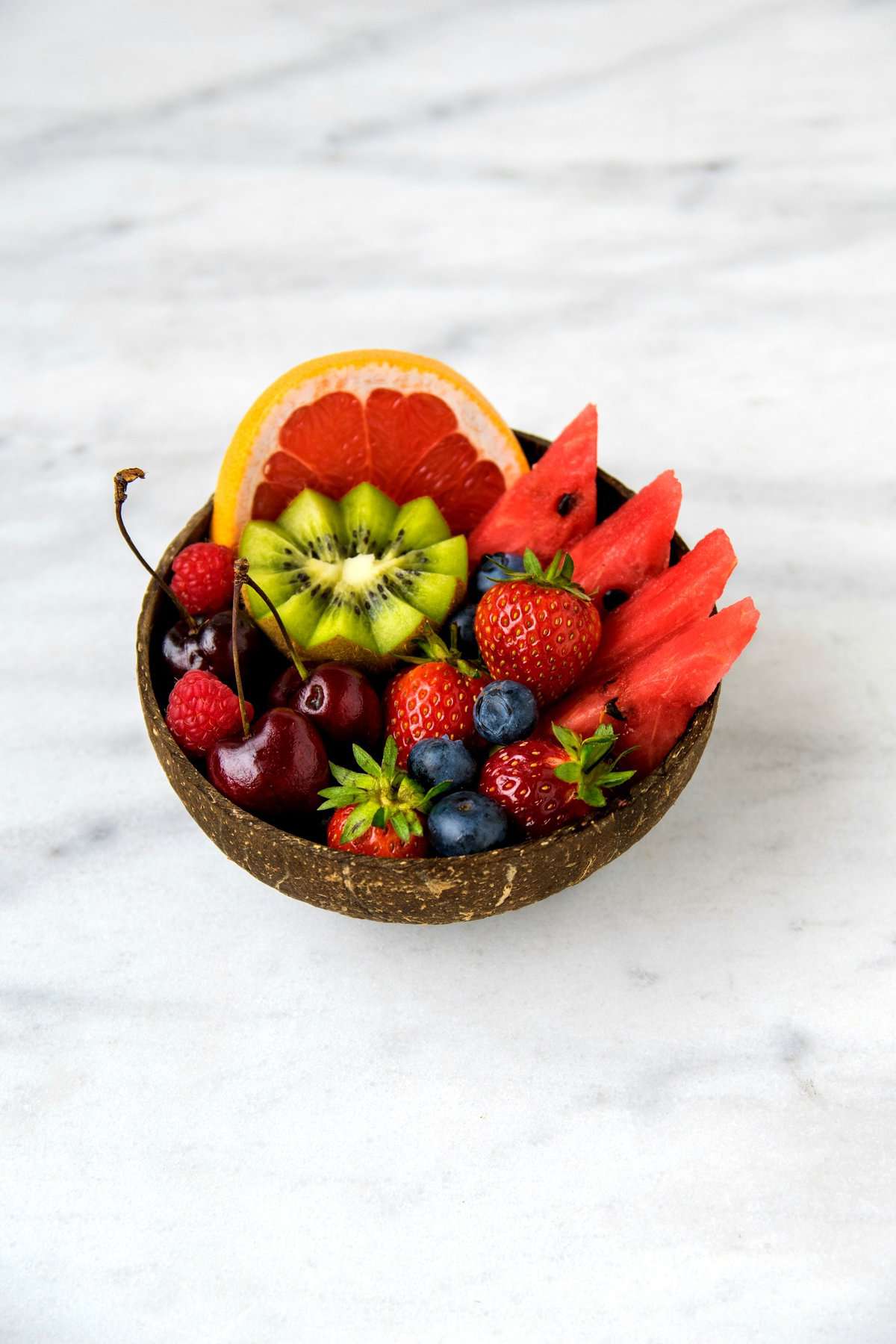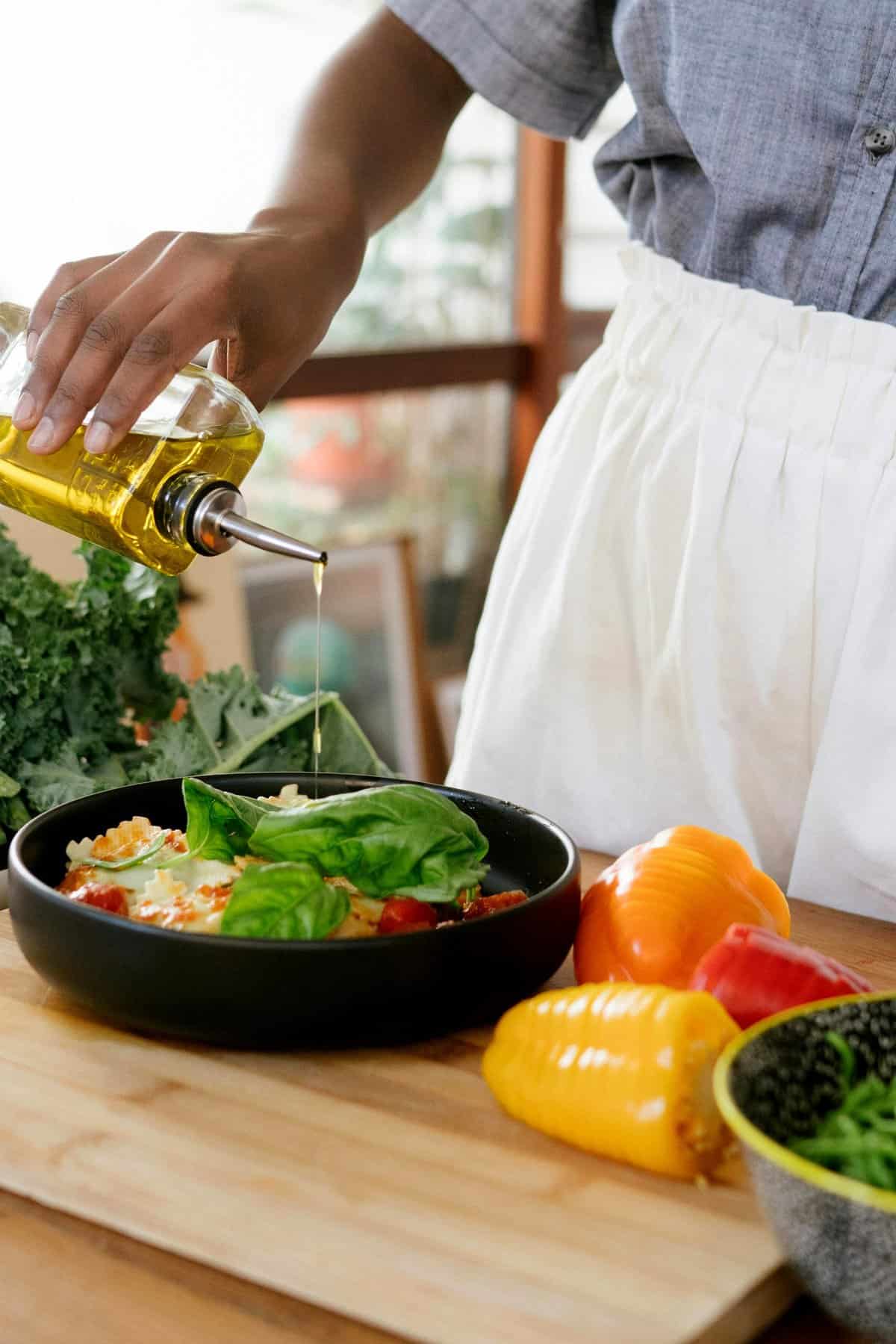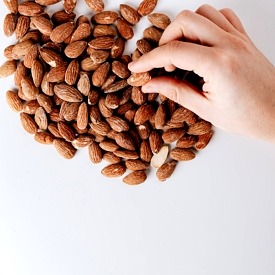Are frugivore diets the secret to health and weight loss? A dietitian reviews this “Raw till 4” high carb, low fat diet to see if eating only fruit is healthy.

If you’re an OG Abbey’s Kitchen fan, you’ll recall me debunking the frugivore diet way back in 2018. It was a time when I was receiving hundreds of messages and emails and DMs from young girls following this diet and suffering from horrendous outcomes: hair loss, raging blood sugars, acne, severe IBS flairs, muscle wasting, amenorrhea, and more.
Unfortunately I’ve seen a resurface of the frugivore diet, with influencers sharing their “healthy diets” made of 90% bananas, watermelon and juices. So this blog post feels a bit like a passing of the torch to the next generation of raw vegan frugivores- as a dietitian, I’m here to debunk some myths and answer common questions about this fruit-based diet.
What is the Frugivore Diet?
Also know as the frutarian diet or frutarianism, the frugivore diet is pretty much what it sounds like: lots and lots of fruits and vegetables. Essentially, the frugivore diet is a more restrictive version of veganism. Along with no animal products, frugivores typically eat very mostly raw produce and may include limited amounts of nuts, seeds, and grains. Similarly, the Raw till 4 diet is a type of frugivore diet, with only raw fruits and greens eaten before 4pm.
Hey, as a dietitian I love fruit. But I’m not sure I could live off fruit and raw veggies alone. A girl can only drink so many green smoothies in a day. Still, there are lots of claims made by various frugivores, so let’s address.
Debunking Common Frugivore Diet Claims

Eat Whatever You Want Without Worrying About Weight Gain
Now this is a dangerous and frankly just incorrect assertion. It doesnt matter what kind of diet you want to follow- keto, weight watchers, calorie counting, or Raw till 4. Weight loss or gain comes down to calories, and that’s just a simple fact of thermodynamics. And if the frugivore “works” for some, it’s because they’ve been able to create a calorie deficit. Not because it’s super satiating or has any magical nutrient.
In fact, despite this diet being made up of only fruit and vegetables, it’s super low in Hunger Crushing Compounds. Fruits and veggies are amazing sources of fibre, water and micronutrients, but not so much protein or fat. Even our “higher protein” vegetables like broccoli only contain 2.8 grams protein per 100 gram weight. That means you’d have to eat almost 900 grams to hit at least 25 grams of protein per meal. My stomach hurts just thinking about that.
So I would argue that most people would not feel very full at all on a diet like this. And if you did, it would be because of the sheer volume or low caloric density of the foods.
You Can Eat Double the Volume of Food as an Average American
The fact that eating 8 lbs of food is treated as a flex is already a red flag to me. Now I’m not diagnosing frugivores with anything, this is just from my own experience as a dietitian and someone who also had an eating disorder. But bragging about my massive portions was exactly what I used to do to hide my eating disorder. To be honest, it did work because people saw me eat a lot so they were thrown off on any suspicions that something was wrong.
But eating massive amounts of ultra low calorie foods in an attempt to stretch the vagus nerve, and trick my body into thinking it was truly nourished, was a clear sign of my eating disorder. I wanted so badly to feel FULL, and the only way to do that without gaining weight was to eat massive amounts of lettuce, broth, and water-rich fruit .
Obviously there is some merit to consuming more high volume foods when on a weight loss diet. We do have research to support that. But I think it’s important to remind ourselves that even if you can hack your brain into thinking it’s “full” by filling your gut with water and fibre, the likelihood of feeling truly satisfied is slim.
Oil is a Waste of Calories

Folks on the frugivore diet love to tout their “oil-free” lifestyle, because apparently oil is empty calories with sit in your stomach without filling it up. But here’s my take on oils and fats while trying to lose weight.
Fats contain more calories per gram than protein or carbs. With that said, they are also slow digesting so they stabilize insulin levels and keep you feeling fuller longer. When weight loss is the goal, I do think we want to get the bulk of our healthy fats from whole food sources where they are bundled up in other Hunger Crushing Compounds. For example, avocado is rich in healthy fats AND fibre. Nuts have healthy fats, protein and fibre. Salmon has healthy fats and protein. And so on.
Oils are just pure fat, aka only one Hunger Crushing Compound. But that doesn’t mean they don’t contribute to fullness or satisfaction. On the contrary, research suggests that added oil does reduce appetite, and hunger hormones when added to meals. It also makes food taste better which is important for the satisfaction piece. I would so miserable eating dry lettuce with no dressing, so you bet I would be face planting into the family sized chips.
At the end of the day, it’s finding a balance between emotional satisfaction and nutrition goals that works for you.
It’s Easier to Convert Dietary Fat into Body Fat
When I heard this frugivore claim, I was pretty amused because it’s simply not true. To sum it up, some on the frugivore diet claim that when compared to carbohydrates, our body readily converts fat from foods into body fat. They claim this is because dietary fat is already fat. At first glance that makes sense, until you grasp any basic human physiology.
Now that is not how weight gain works. Carbs may be our body’s preferred fuel for immediate energy, but that doesn’t mean they can’t be converted to fat. In fact, if you want to get down to the nitty gritty, you could argue that foods that increase insulin or promote insulin resistance (aka carbs) may preferentially promote fat storage.
But if that’s what weight gain actually came down to, carbs would actually be a bigger culprit, particularly low fibre, high sugar carbs like bananas, grapes, watermelon etc. But ultimately, the research shows that what matters is calories. It doesn’t matter what the energy source is- if you have more calories than what you need, that substrate will be stored as fat. Even if those calories come from carbs.
Frugivore Diets Have the Perfect Macro Split
Apparently, following a frugivore diet allows you to naturally fall into the “perfect macro split” of 80% carbohydrates, 10% fat and 10% protein. Fact or fiction? Spoiler, it’s probably fiction.
Assuming calories are appropriate, North Americans pretty consistently consume 15% of calories from protein. There’s actually a really interesting concept called the protein leverage hypothesis that suggests that protein intake is more strongly regulated than the intake of carbohydrates and fats. And when we reduce our protein intake below 15%, we compensate by increasing our calories until we reach that 15%. So if you’re not also carefully controlling calories and just going hog wild on the fruit, there is a pretty good chance you’re not going to end up in a calorie deficit.
I talked about optimal macros for weight loss in this post, but fat loss increases 4 fold when we go from 10-15% of calories from protein to 20-30%. Yet even if fat loss is not the goal, 10% protein isn’t even enough for baseline bare minimum health. The lowest of the low recommendations for protein is 0.8-1 g per kg of body weight. And that’s like bottom of the barrel basic, not if we’re trying to lose weight or build muscle. For a 120 lb person, that would be 43-54 grams of protein. It’s really so little in my professional opinion and yet, some frugivore diets don’t even provide that. Poor protein intake can result in muscle wasting, reduced energy digestibility and fatty liver, and these effects can persist well beyond quitting the diet.
Ditto for the low fat. We know that fat intakes below 20% can result in hormone dysregulation- low testosterone in men and low estrogen in women, which obviously can affect fertility. That’s not something we want to mess with. So I’d say that this “perfect macro split” attained by a frugivore diet is actually far from ideal.
Final Thoughts on the Frugivore Diet
You know, I keep thinking that debunking content like this is like captain obvious. But when I see people who legitimately think the frugivore diet will solve all their health problems, it just makes me genuinely said. Truly, I have soo much empathy for the vulnerable individuals who are following this. When something credible looking makes a strong argument on TikTok, it’s pretty easy to get sucked in. And while of course there will always be anomalies who will thrive on a diet like this, it’s a pretty slippery slope for like everyone else.
So bottom line? Fruit is amazing, fruit is nutritious, and I love fruit. But a girl cannot thrive on fruit alone, even if you throw in some potatoes. Don’t forget about protein and healthy fats, because those are important too.

More Blog Posts You Might Like
Want to learn more about different vegan diets? I debunk more myths and share the science here:
- Raw Till 4 Review | The Hard Truth on this Extreme Vegan Diet
- Is Vegetable Oil Bad for You? The Vegan Oil Free Diet
- Vegan Diet and Bloating | How to Improve Gut Health
- Is a Vegan or Vegetarian Diet Safe for Pregnancy?
Now I want to hear from you: what claims have you heard about the frugivore diet?
Updated on May 20th, 2024

Abbey Sharp is a Registered Dietitian (RD), regulated by the Ontario College of Dietitians. She is a mom, YouTuber, Blogger, award winning cookbook author, media coach specializing in food and nutrition influencers, and a frequent contributor to national publications like Healthline and on national broadcast TV shows.





Leave a Comment